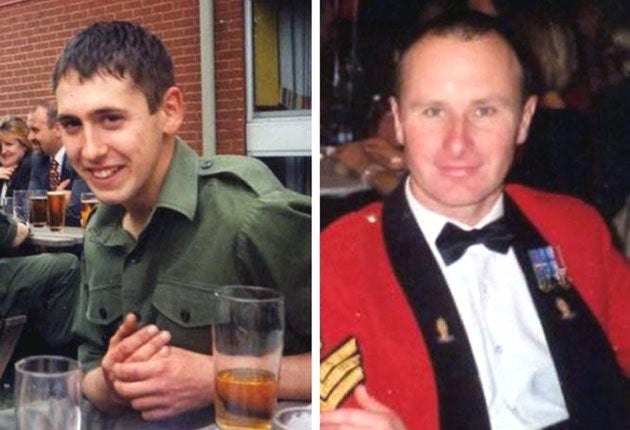Iraqis accused of murdering British troops want sanctuary

Your support helps us to tell the story
From reproductive rights to climate change to Big Tech, The Independent is on the ground when the story is developing. Whether it's investigating the financials of Elon Musk's pro-Trump PAC or producing our latest documentary, 'The A Word', which shines a light on the American women fighting for reproductive rights, we know how important it is to parse out the facts from the messaging.
At such a critical moment in US history, we need reporters on the ground. Your donation allows us to keep sending journalists to speak to both sides of the story.
The Independent is trusted by Americans across the entire political spectrum. And unlike many other quality news outlets, we choose not to lock Americans out of our reporting and analysis with paywalls. We believe quality journalism should be available to everyone, paid for by those who can afford it.
Your support makes all the difference.Two Iraqis accused of the murder of two captive British soldiers will have their human rights violated if they are surrendered to their own authorities, the High Court was told yesterday.
After five years and the loss of 301 British service personnel in Iraq or Afghanistan, the killing of Staff Sergeant Simon Cullingworth and Sapper Luke Allsopp are still among the most shocking. The two bomb disposal experts were dragged from their vehicles during an ambush within days of the Iraq invasion. Taken to an intelligence base, they were shot and filmed as they lay dying, surrounded by a baying mob. A month later, their bodies were found in shallow graves.
Their families were first told they died in combat, then Tony Blair, the prime minister at the time, revealed the nature of the killings, describing it as "cruelty beyond all human comprehension". Yesterday, lawyers for the two men accused of the murders, Faisal Al-Saadoon, 56, and Khalaf Mufdhi, 58, the last two prisoners in British custody in Basra, insisted that they face torture and the death penalty if they go on trial in Iraq for war crimes.
The Defence Secretary, John Hutton intends transferring the men to be tried before the Iraqi Higher Tribunal (IHT). But Karon Monaghan QC, for Mr Saadoon and Mr Mufdhi, who both deny involvement in the deaths, said there was "a real risk" of a "flagrantly unfair trial before the IHT, and the death penalty thereafter".
The QC told Lord Justice Richards and Mr Justice Silber, in an application for judicial review at the High Court, that they could also face "torture and inhuman and degrading treatment" before and after their trials. This, she said, would violate the European Convention on Human Rights and the 1998 Human Rights Act and run counter to the Government's policy of not exposing any individual to the risk of the death penalty.
The continued detention of both men was unlawful and they should be released and given secure passage "to an agreed location", Ms Monaghan said. The Defence Secretary is arguing the men are lawfully held and there is insufficient evidence that their human rights would be at risk if transferred to the Iraqi authorities. The Ministry of Defence, the Foreign Office and the Ministry of Justice insist they have been given assurances at the "highest level" that both men will receive a fair trial and be treated humanely, whatever the outcome of the case.
The legally aided hearing, due to last three days, is said to have angered the dead soldiers' relatives, who want to see the men stand trial. At an inquest into the deaths of Sgt Cullingworth, 36 and married with two small sons, and Spr Allsopp, 24, both of 33 Engineer Regiment (Explosive Ordnance Disposal), The coroner, Andrew Walker, severely criticised a lack of planning which led to their capture in March 2003.
The pair had taken a route on which the ITN journalist Terry Lloyd, 51, had been killed in a crossfire a day earlier. Instead of being told to skirt Az-Zubayr, 20 miles south-west of Basra, they were ordered to go through the outskirts and took a wrong turn where the two-vehicle convoy was ambushed by fedayeen militiamen.
The soldiers were taken to an Iraqi intelligence base, and shot repeatedly. Film footage released to the Arabic TV channel al-Jazeera showed Spr Allsopp was alive four hours after capture, and died amid a baying mob.
Phil Shiner, a lawyer for both Iraqis, has claimed they did not have a "hope in hell" of a fair hearing in what is "just a political show trial". The case continues.
Join our commenting forum
Join thought-provoking conversations, follow other Independent readers and see their replies
Comments